[Event Report] A Legacy Event for the 2023 G7 Hiroshima Summit “Charting a Course for Global Leadership from Japan in Inclusion and Innovation for Dementia.” (May 28, 2023)
date : 8/7/2023
Tags: Dementia
![[Event Report] A Legacy Event for the 2023 G7 Hiroshima Summit “Charting a Course for Global Leadership from Japan in Inclusion and Innovation for Dementia.” (May 28, 2023)](https://hgpi.org/en/wp-content/uploads/sites/2/dementia-20230528-2-top.png)
*A recording with English subtitles has been available (December 26, 2023)
On 28th May 2023, HGPI hosted a Legacy Event for the 2023 G7 Hiroshima Summit “Charting a Course for Global Leadership from Japan in Inclusion and Innovation for Dementia” at Kasumi Campus of Hiroshima University.
Recognizing dementia as a key policy issue at the global level, Health and Global Policy Institute (HGPI) has made various efforts in its capacity as a policy think-tank to conduct research and offer recommendations on dementia. The G8 Dementia Summit held in the U.K. in 2013 accelerated global policy initiatives for dementia and progress is now being made in collaborative efforts that span countries and regions. There has been particularly noteworthy progress in efforts to build inclusive societies. Japan was one of the first countries to take action for this objective, such as in efforts to amplify the voices of people living with dementia and their families and to encourage their involvement in the policy formulation process as described by the Japanese National Framework for Promotion of Dementia Policies. This year marks one decade since the G8 Dementia Summit and it is now Japan’s turn to take the lead in addressing this global issue as chair of the G7 Summit.
Given this opportunity, HGPI has planned a symposium to be held in Hiroshima, host city of the G7 Summit. There, multi-stakeholders including representatives of civil society, the research community, industry, and the Government will hold discussions to reaffirm their awareness toward dementia in Japan, the country where population aging has advanced the most. In addition to examining how Japan can contribute to the international community, we will think about the development of methods of treating and preventing dementia with a focus on the underlying causes of dementia, an item which has been the subject of growing attention in recent years. We will also examine the future structure of the healthcare provision system needed to fully implement such innovations. There are also increasing expectations for us to establish systems and utilize digital technology for early detection, diagnosis, and response to dementia. Additionally, creating systems that emphasize the needs and opinions of people living with dementia and their families will be essential for implementing these new initiatives in society.
Recognizing that Japan must lead the international community in building an inclusive society and in innovation, this symposium deepened discussions from these perspectives to examine the latest initiatives, issues, and future prospects for dementia as a policy issue at the global level.
■A recording with English subtitle (3:23:51)
[Overview] (in no particular order)
- Date & time: Sunday, May 28, 2023; 13:00-17:00 JST
- Venue: Ryoun Lecture Building 5F, R501, Hiroshima University Kasumi Campus (1-2-3 Kasumi, Minami-ku, Hiroshima City, Hiroshima)
- Format: Onsite (no live broadcasting), archive will be available in due course
- Language: Japanese
- Participation Fee: Free
- Host: Health and Global Policy Institute (HGPI)
- Co-hosts: Alzheimer’s Association Japan (AAJ); the Japan Dementia International Exchange Platform
- Support: Hiroshima University
- Sponsor: Integra LifeSciences Corporation., Sompo Holdings, Inc., National Graduate Institute for Policy Studies (GRIPS) Global Health Innovation Policy Program (GHIPP)
[Program] (Titles omitted; in no particular order)
13:00-13:10 Opening remarks
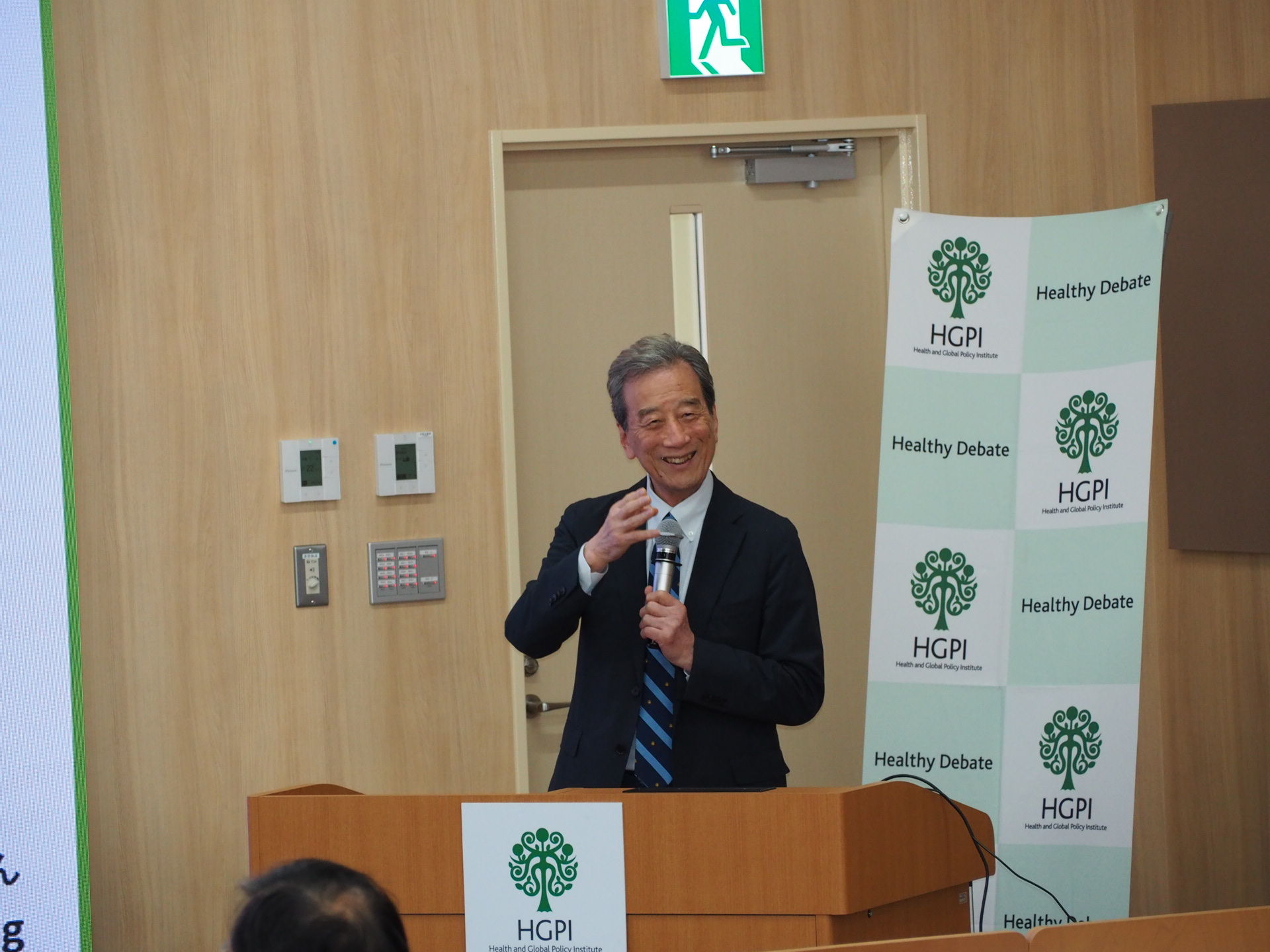 Kiyoshi Kurokawa (Chairman, HGPI; Special Advisor, Hiroshima University; Member and Vice Chair, World Dementia Council (WDC); Professor Emeritus, National Graduate Institute for Policy Studies)
Kiyoshi Kurokawa (Chairman, HGPI; Special Advisor, Hiroshima University; Member and Vice Chair, World Dementia Council (WDC); Professor Emeritus, National Graduate Institute for Policy Studies)
What will be important in the future is diagnosing dementia. It will be vital that we learn to grasp the degree of progression and become able to visualize future risk so dementia can be prevented. Certain risks can be predicted. For example, cholesterol levels can tell us arteriosclerosis risk. If we can learn how to gauge dementia risk using simple tests, we will then be able to mount effective countermeasures. The research conducted by scientists is unpredictable, but we might be able to gather hints about dementia from people in other specialties. Japan is currently home to more than 90,000 people who are age 100 and over. As people become more aware of the fact that dementia is something that concerns them and begin discussing it, it may become possible for us to gather hints from the wisdom of the general public. I have high expectations for such a society.
13:10-14:00 Panel discussion 1: Japan’s National Strategy for Dementia and Contributing to the International Community – A Look Back on the G7 Summit
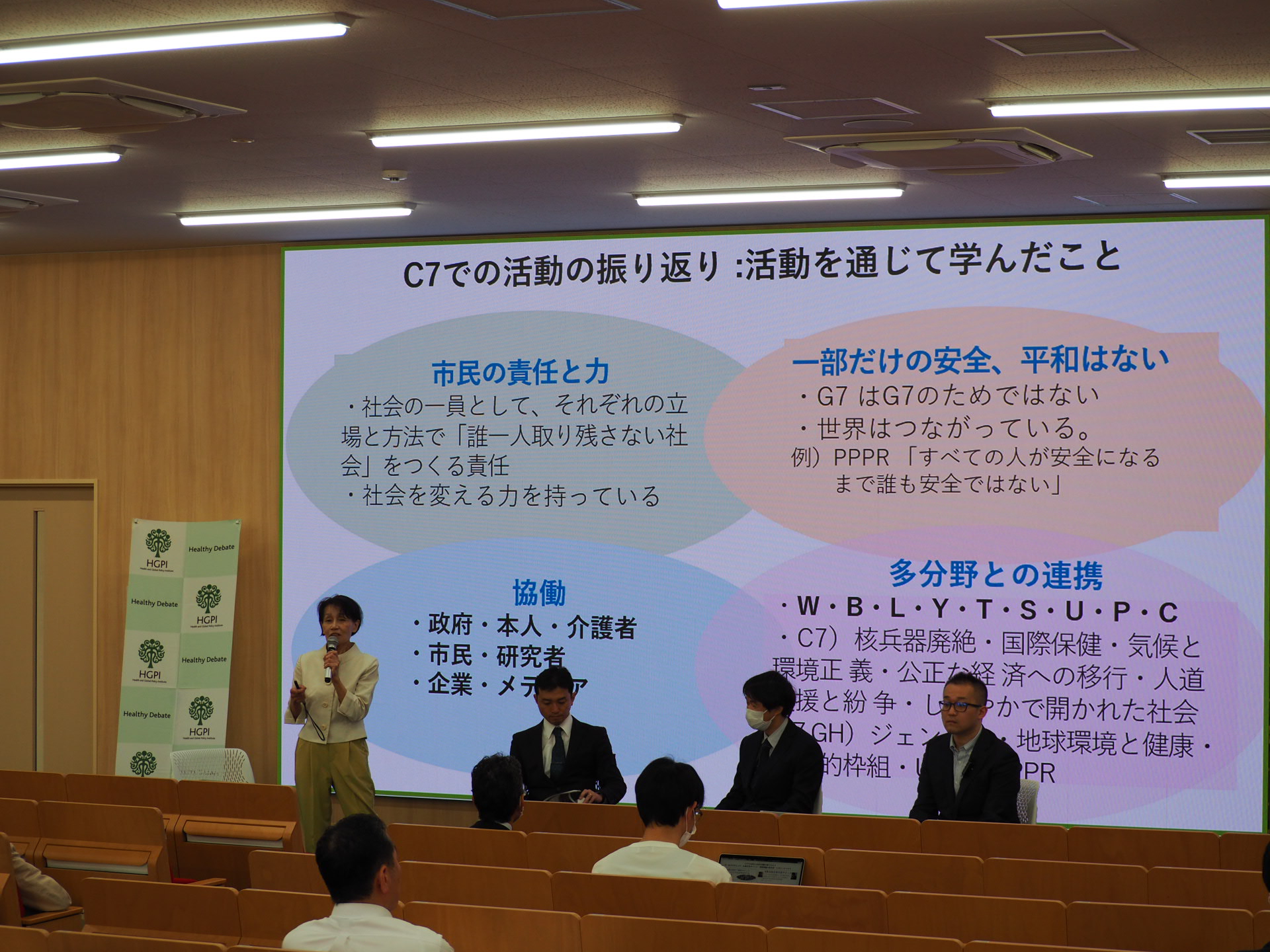 Panelists:
Panelists:
Shinya Ishii (Specially–appointed Professor, Symbiotic Social Medicine Course, Graduate School of Medicine, Hiroshima University)
Japan’s National Strategy for Dementia and Contributions to the International Community – Reflecting on the G7 Summit
“Community-based comprehensive care” was mentioned in the Communiqué presented after the G7 Health Ministers’ Meeting in Nagasaki and can be considered one outstanding initiative from Japan. While Japan is currently advancing various other initiatives for dementia including the dementia supporter training program, the National Framework for Promotion of Dementia Policies (hereinafter referred to as “the Framework”), efforts for “dementia barrier-free,” and the Japan Dementia Public-Private Council, the 2022 progress evaluation of the Framework showed that future efforts must be made to build awareness and support the ability of those most affected to have their voices heard. Starting with the New Orange Plan and the Framework, Japan has continuously formulated national plans for dementia and has advanced initiatives in this area. Japan should maintain this momentum and be proactive about transmitting information to the international community.
Noriyo Washizu (Director, AAJ)
The International Role of Alzheimer’s Association Japan: Our Activities at the C7
Together with Alzheimer’s Disease International (ADI), Alzheimer’s Association Japan (AAJ) participated in Civil Society 7 (C7), one of the official engagement groups of the G7 Hiroshima Summit. Representing civil society at the global level, we worked together with NGOs around the world to formulate policy recommendations that we handed to Prime Minister Kishida. As a result, the G7 Health Ministers’ and G7 Leader’s Communiques both included clear mention of aging and dementia. Moving forward, AAJ will continue working to promote bilateral, multifaceted, and multilayered international exchange to advance the Japan Dementia International Exchange Platform and support the four-year extension of the WHO Global Action Plan on Dementia (2017-2025).
Kousuke Wada (Director for Dementia Strategy, Division of Dementia Policy and Community-Based Long-Term Care Promotion, Health and Welfare Bureau for the Elderly, Ministry of Health, Labour and Welfare (MHLW))
Dementia and International Strategies: Reflecting on the G7 Health Ministers’ Meeting in Nagasaki
“Inclusion” and “risk reduction” were the focus of discussions at the G7 Health Ministers’ Meeting in Nagasaki, which was held ahead of the G7 Hiroshima Summit. Regarding dementia and aging, the Communiqué emphasized the importance of coordination among healthcare and long-term care, holding multi-stakeholder consultations that include the public and private sectors, and the need to accelerate R&D to improve health outcomes with a total package that includes prevention and risk reduction as well as early detection, diagnosis, and response. It also mentioned the need to note that other forms of dementia besides Alzheimer’s disease (AD) have been identified.
Moderator:
Shunichiro Kurita (Senior Manager, HGPI)
14:00-14:20 Keynote lecture: Current Circumstances and Future Prospects for the Innovations in Dementia Research
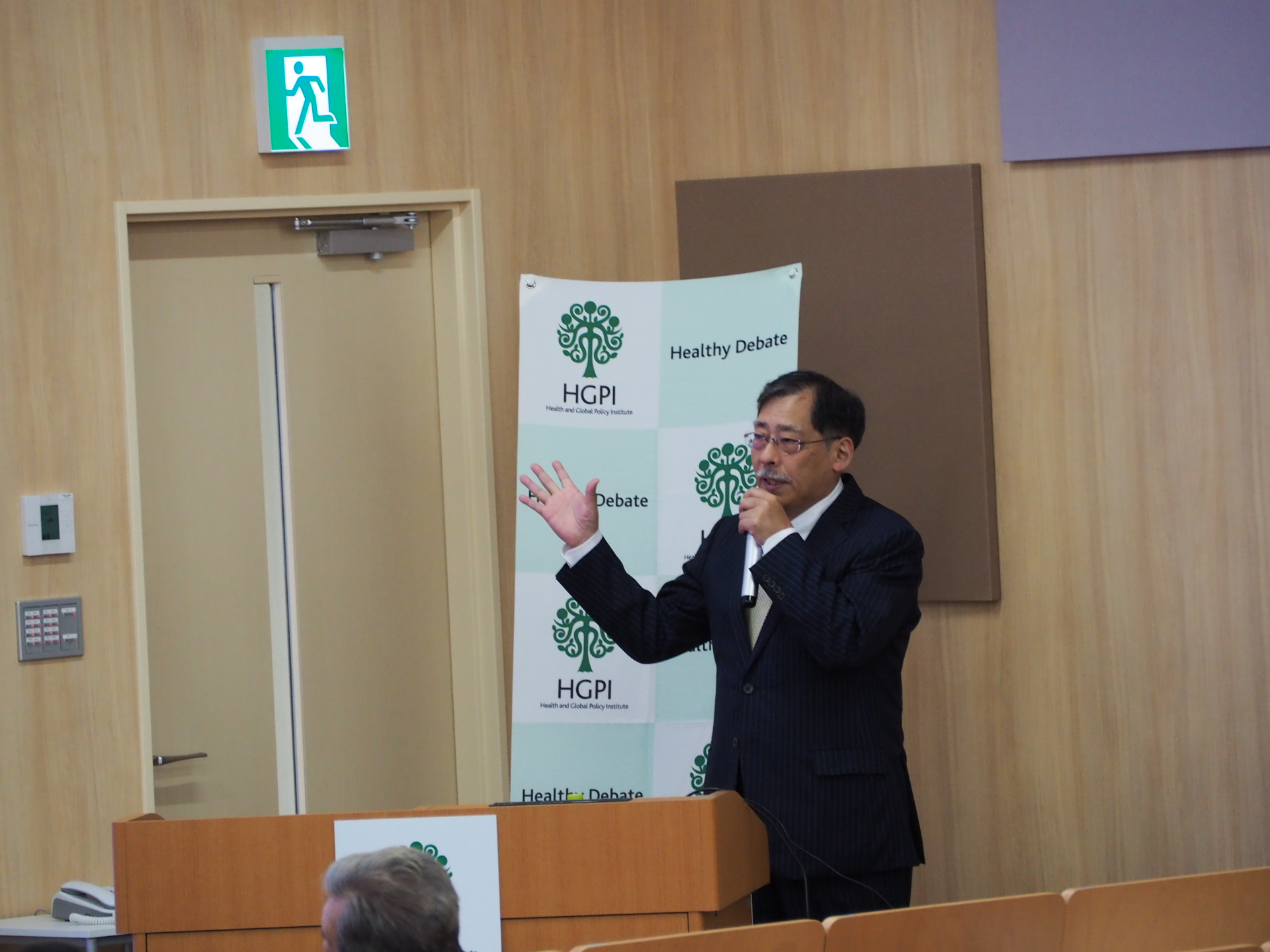 Takeshi Iwatsubo (Professor, Department of Basic Neuroscience, Department of Neurology, Graduate School of Medicine, The University of Tokyo; Chairman, Japan Society for Dementia Research)
Takeshi Iwatsubo (Professor, Department of Basic Neuroscience, Department of Neurology, Graduate School of Medicine, The University of Tokyo; Chairman, Japan Society for Dementia Research)
As anticipation for disease-modifying drugs for AD continues to increase, the J-ADNI study has enabled us to detect the symptoms of mild cognitive impairment (MCI), an early stage of AD, as well as to measure rate of progression. We have also established a nationwide network for amyloid PET scans, making it possible to conduct global clinical trials for disease-modifying AD drugs in Japan. Furthermore, the establishment of the Japanese Trial-Ready Cohort (J-TRC) means that AD treatment and prevention in the very early or preclinical stages is now within range. There are also high expectations that introducing blood biomarkers (Ab42, p-tau, etc.) will streamline PET analysis. In this manner, disease-modifying drugs that meet the expectations of people living with dementia, their families, and the public will soon be a reality.
14:25-15:35 Panel discussion 2: Innovation in Dementia Treatment and the Healthcare Provision System of the Future
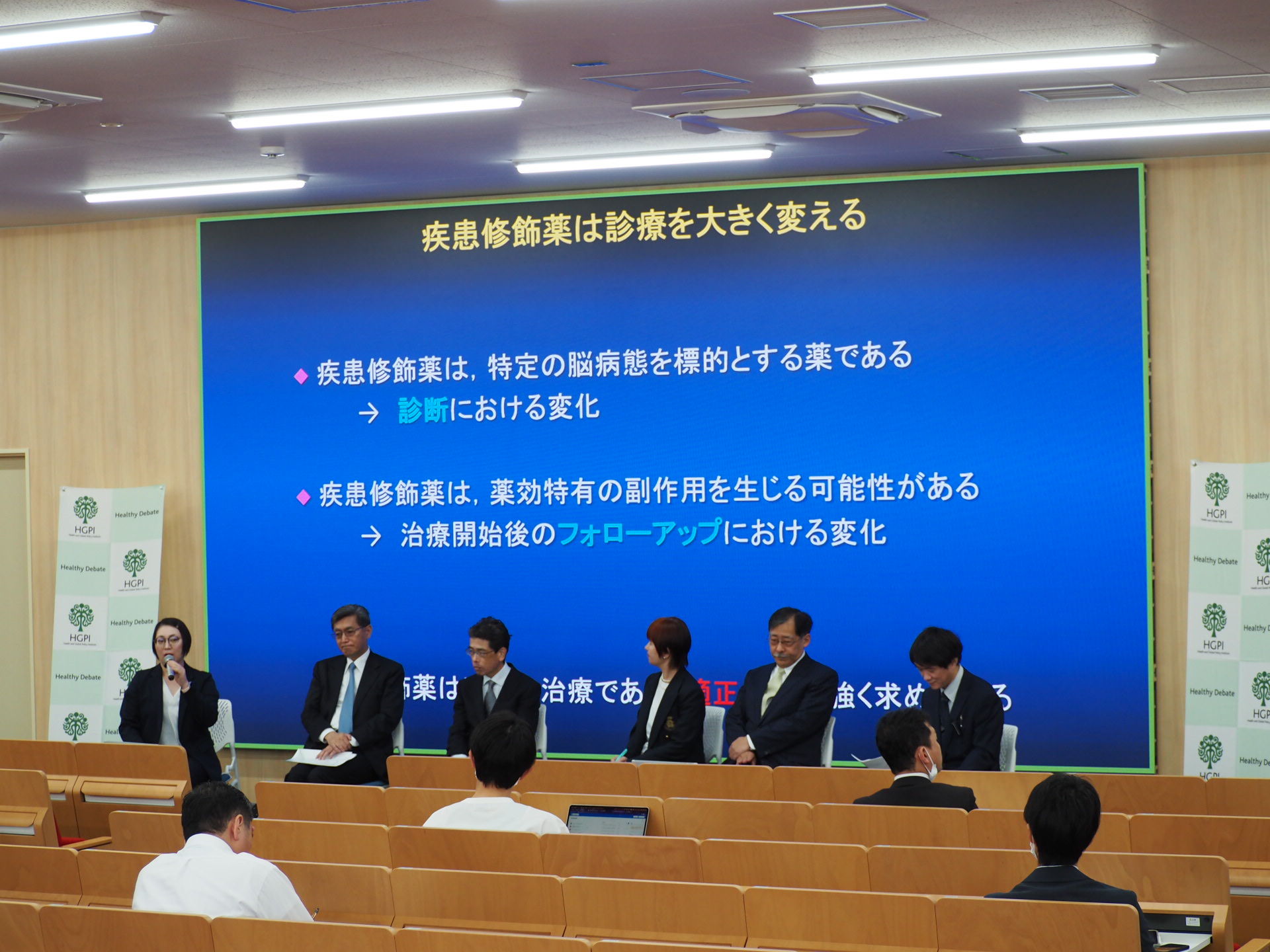
Panelists:
Junko Amano (Executive Director, Hiroshima Medical Association)
Innovation in Dementia Treatment and the Healthcare Provision System of the Future – Initiatives in Hiroshima
An Expert Committee on Dementia Response Measures has been established at the Hiroshima Prefectural Regional Response Council, which consists of the Hiroshima Prefectural Government, Hiroshima City, Hiroshima University, and the Hiroshima Prefectural Medical Association. This fiscal year, multidisciplinary professionals at that committee are collaborating on 1) developing educational and training programs to enhance quality in dementia response measures; 2) establishing a support system for dementia in mountainous areas and remote islands; and 3) conducting a survey to grasp real-world circumstances surrounding early-onset dementia. Every year, the Hiroshima Prefectural Medical Association conducts a training program called the “Family Doctor Training Program for Better Dementia Response” to ensure dementia care is high-quality. The Hiroshima Prefectural Medical Association places great emphasis on the importance of having a collaborative system that involves family doctors (known as “Orange Doctors”), dementia support physicians, and medical centers for dementia.
Shuichi Awata (Director, Integrated Research Initiative for Living Well with Dementia, Tokyo Metropolitan Geriatric Hospital and Institute of Gerontology)
Innovation in Dementia Treatment and the Healthcare Provision System of the Future
The national and prefectural governments and designated cities have been obligated to establish “Early AD Diagnosis Institutions” and “Institutions Providing Disease-Modifying Therapies” (DMTs), as well as to incorporate these facilities into existing healthcare and long-term care service provision systems. Meanwhile, medical centers for dementia have been obligated to ensure accessibility for these services. In the future, the number of elderly people with dementia living in one-person households is projected to increase rapidly. This means an environment for enhancing accessibility must be created in each region, including urban areas and island regions. Whether DMTs are introduced or not, it will be important to expand the systems that support people living with dementia to make society a place where people can live with peace of mind even if they develop dementia.
Ryoko Ihara (Head Physician, Department of Neurology, Tokyo Metropolitan Geriatric Hospital and Institute of Gerontology)
Innovation in Dementia Treatment and the Healthcare Provision System of the Future – Making the Use of Biomarkers a Central Part of Care
The disease-modifying drugs for AD that are in the process of securing regulatory approval in Japan can only be used in cases which have specific molecular pathologies with biomarker tests (such as amyloid PET scans or cerebrospinal fluid tests). However, there are disparities in access to biomarker testing among regions, and determining which tests are positive and which are negative requires a certain amount of training. It is also desirable that steps are taken to secure opportunities for frequent MRI imaging and booths for test administration by adopting role-sharing and promoting collaboration between specialized healthcare institutions and administering organizations on a regional basis. It will also be necessary to provide education and build awareness using methods tailored to the respective roles of people living with dementia and their families, local family doctors, and local specialized healthcare institutions.
Motoharu Kawai (Director, AAJ; Representative Manager, Yamaguchi Branch, AAJ; Vice Director, Neuromuscular Center Yoshimizu Hospital)
Expectations for New Pharmaceuticals and Issues Facing the Healthcare Provision System
While many people living with dementia or their family members hope for disease-modifying drugs to cure dementia, these drugs do not cure dementia. However, they will kick off a new era of progress in early detection and treatment. To be considered eligible for disease-modifying drugs, patients must (1) visit a healthcare institution and be diagnosed with early-stage AD and (2) test positive for amyloid-beta. This means steps must be taken to ensure equity in AD treatment, including amyloid PET scans. Taking the creation of an inclusive society into account, it will also be necessary to continue providing early intervention and support for treatment and care for other diseases including non-Alzheimer dementias and cases of dementia in the middle and later stages.
Takeshi Iwatsubo (Professor, Department of Basic Neuroscience, Department of Neurology, Graduate School of Medicine, The University of Tokyo; Chairman, Japan Society for Dementia Research)
Moderator:
Shinya Ishii (Specially–appointed Professor, Symbiotic Social Medicine Course, Graduate School of Medicine, Hiroshima University)
Recess
15:50-16:50 Panel discussion 3: Risk Reduction, Early Detection, and Innovation for Dementia
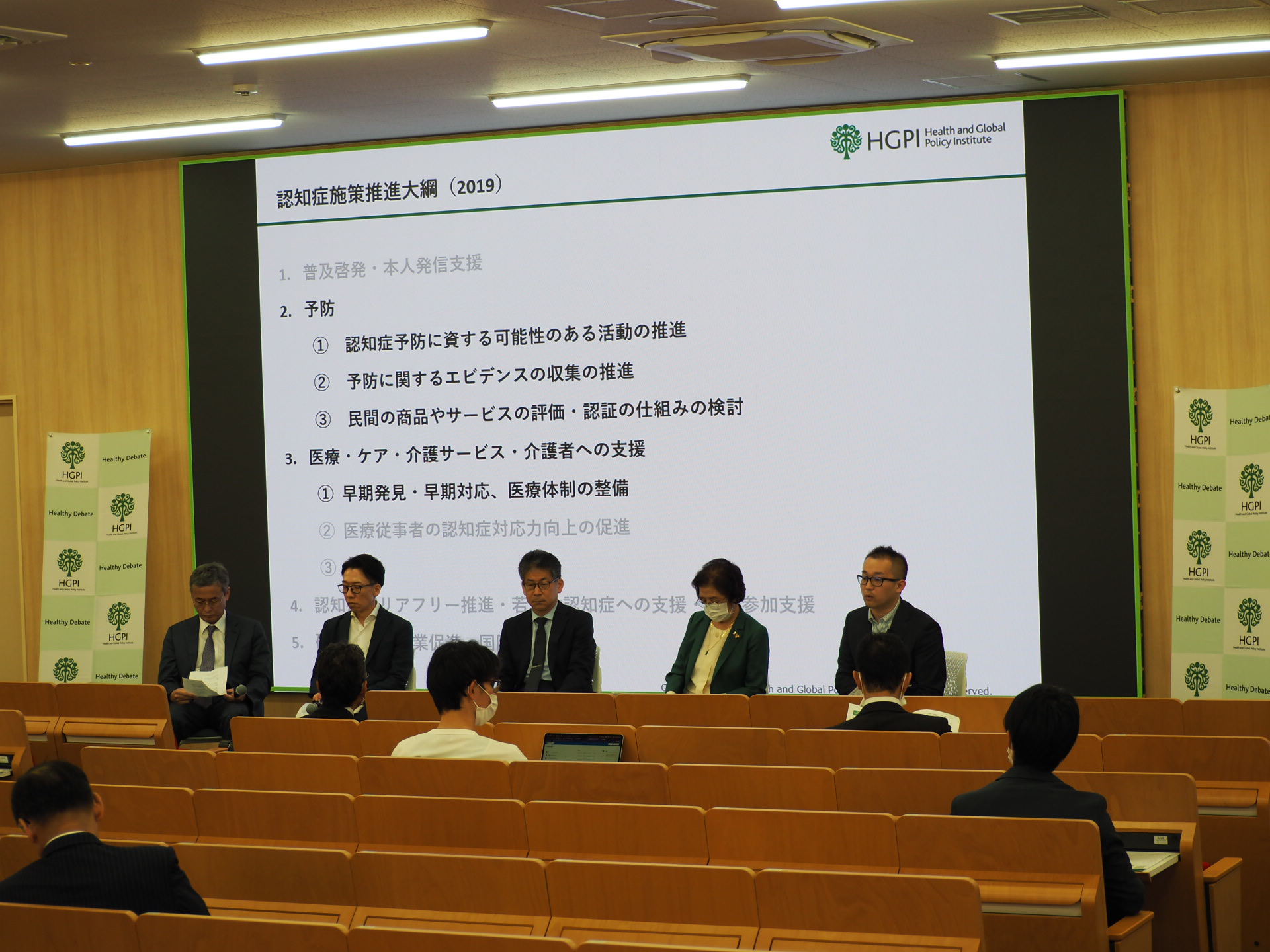 Panelists:
Panelists:
Haruhiko Kishima (Professor and Chairman, Department of Neurosurgery, Osaka University Graduate School of Medicine; Director, International Medical and Engineering Information Center, Osaka University)
Idiopathic Normal Pressure Hydrocephalus – A Form of Dementia that Improves with Surgery
Idiopathic Normal Pressure Hydrocephalus (iNPH) is a form of dementia that can improve with surgery. iNPH is highly prevalent among older adults, but it is reported in less than 10% of all patients. It presents a triad of symptoms that includes cognitive impairment, gait disturbance, and urinary incontinence. The Japanese Society of NPH recommends proactive MRI imaging to detect iNPH. If MRI images show signs of iNPH and symptoms improve with a CSF tap test, then shunting is highly likely to be effective.
Takashi Sakurai (Professor, Department of Prevention and Care Science, Center for Development of Advanced Medicine for Dementia, National Center for Geriatrics and Gerontology)
Japan-multimodal intervention Trial for prevention of dementia (J-MINT) Progress and Efforts to Implement the Use of Its Findings in Society
While interventions being provided as part of the Japan-multimodal intervention Trial for prevention of dementia (J-MINT) were suspended after a state of emergency was declared for the COVID-19 pandemic, interventions were completed in the regions considered eligible for online interventions and results are now under review. Efforts are currently underway to validate the J-MINT social implementation model so that it can be expanded horizontally. Establishing methods of preventing dementia is an issue that we must address, and this means we must develop evidence-based services. Efforts to build awareness should be advanced at the same time to ensure all generations can obtain a correct understanding of dementia.
Taisuke Hashimoto (Director, Healthcare Industries Division, Commerce and Service Industry Policy Group, Ministry of Economy, Trade and Industry (METI))
Efforts to Establish an Environment for a Preventive Services Market from the Dementia Innovation Alliance Public and Private Sector Working Group
The Dementia Innovation Alliance Public and Private Sector Working Group considered desirable methods of evaluating the quality of prevention solutions and formulated recommendations for providers of dementia prevention-related services (excluding drug therapy and similar treatments). The recommendations emphasized the importance of maintaining conformity among the content and results of effectiveness verification and how providers communicate the effectiveness of their services. Another key point was the importance of utilizing appropriate research methods and setting appropriate indicators during effectiveness verification.
Keiko Murakami (Caregiver Representative, Hiroshima Branch, AAJ)
AAJ’s 42-year history
The Hiroshima Branch of AAJ was founded in 1981 by five people who were serving as long-term care providers to family members and was originally named, “The Association of Families Supporting People with Dementia.” Later, it was an early actor to focus on dementia among members of the working-age population and established a place for people living with early-onset dementia and their family members to gather called “The Sunny Spot Association” in December 2003. In February 2007, it hosted an event in Hiroshima called, “A Summit for Early-Onset Dementia: Difficulties and Ways of Living for People with Early-Onset Dementia and Their Families.” It was attended by 600 people from throughout the country and prompted nationwide action on early-onset dementia. The steering committees of the ten medical centers for dementia in Hiroshima Prefecture include informal care providers from local communities. Working together with specialists and other people serving in various positions, they would like to pass the baton to the next generation so AAJ activities can continue.
Moderator:
Shunichiro Kurita (Senior Manager, HGPI)
16:50-17:00 Closing remarks
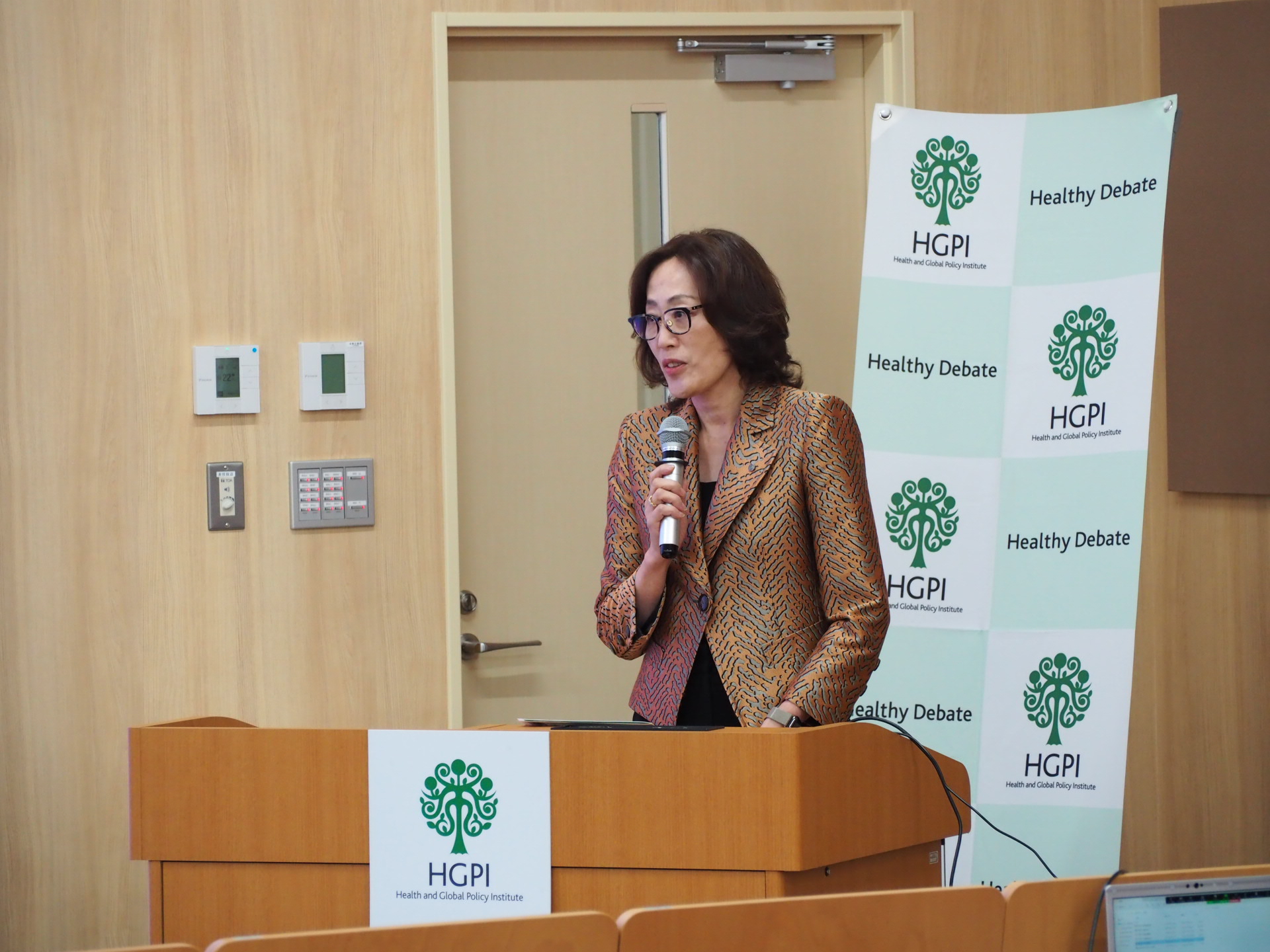 Junko Tanaka (Executive Vice President, Hiroshima University)
Junko Tanaka (Executive Vice President, Hiroshima University)
In the modern era, when anyone can develop dementia, this symposium demonstrated that Japan is engaged in various innovative measures for dementia. It allowed us to reinforce our understanding that dementia policies are driving innovation along the parallel tracks of inclusion and prevention. As it transitions to a super-aging society, Japan’s efforts let us feel hope for the future and limitless potential. As the last of the nine events it hosted to mark the G7 Hiroshima Summit, Hiroshima University was able to transmit a meaningful message to the world through this symposium. As a knowledge center that engages in science to open the path to sustainable development, Hiroshima University hopes to contribute to efforts for dementia aimed at innovation and prevention.
Top Research & Recommendations Posts
- [Policy Recommendations] The Path to a Sustainable Healthcare System: Three Key Objectives for Public Deliberation (January 22, 2026)
- [Research Report] Perceptions, Knowledge, Actions and Perspectives of Healthcare Organizations in Japan in Relation to Climate Change and Health: A Cross-Sectional Study (November 13, 2025)
- [Research Report] The 2025 Public Opinion Survey on Healthcare in Japan (March 17, 2025)
- [Policy Recommendations] Reshaping Japan’s Immunization Policy for Life Course Coverage and Vaccine Equity: Challenges and Prospects for an Era of Prevention and Health Promotion (April 25, 2025)
- [Research Report] The 2023 Public Opinion Survey on Satisfaction in Healthcare in Japan and Healthcare Applications of Generative AI (January 11, 2024)
- [Research Report] AMR Policy Update #4: Cancer Care and AMR (Part 1)
- [Policy Recommendations] Developing a National Health and Climate Strategy for Japan (June 26, 2024)
- [Public Comment Submission] “Assessment Report on Climate Change Impacts in Japan (Draft Overview)” (December 24, 2025)
- [Research Report] Survey of Japanese Physicians Regarding Climate Change and Health (December 3, 2023)
- [Research Report] The Public Opinion Survey on Child-Rearing in Modern Japan (Final Report) (March 4, 2022)
Featured Posts
-
2026-01-09
[Registration Open] (Hybrid Format) Dementia Project FY2025 Initiative Concluding Symposium “The Future of Dementia Policy Surrounding Families and Others Who Care for People with Dementia” (March 9, 2026)
![[Registration Open] (Hybrid Format) Dementia Project FY2025 Initiative Concluding Symposium “The Future of Dementia Policy Surrounding Families and Others Who Care for People with Dementia” (March 9, 2026)](https://hgpi.org/en/wp-content/uploads/sites/2/dementia-20260309-top.png)
-
2026-02-05
[Registration Open] (Webinar) The 141st HGPI Seminar “Current Status and Future Prospects of Korea’s Obesity Policy: Voices of People with Lived Experience in Policy Promotion” (March 3, 2026)
![[Registration Open] (Webinar) The 141st HGPI Seminar “Current Status and Future Prospects of Korea’s Obesity Policy: Voices of People with Lived Experience in Policy Promotion” (March 3, 2026)](https://hgpi.org/en/wp-content/uploads/sites/2/hs141-top-1.png)
-
2026-02-06
[Research Report] AMR Policy Update #5: Cancer Care and AMR (Part 2)
![[Research Report] AMR Policy Update #5: Cancer Care and AMR (Part 2)](https://hgpi.org/en/wp-content/uploads/sites/2/HGPI_20260204_AMR-Policy-Update-5.png)




